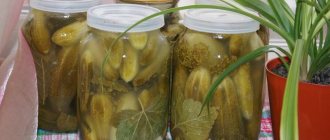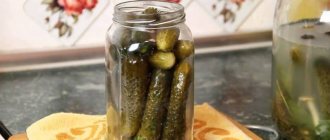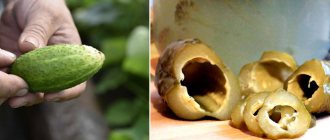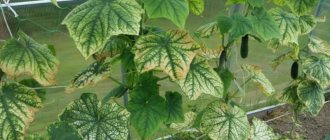Canned cucumbers have become cloudy - what to do?
Situations arise when it is not the solution that becomes cloudy, but the canned cucumbers themselves. This is a normal sign if it occurs the first day after salting. However, if this effect lasts more than 4 days
, then the product is considered spoiled.
First you need to taste them. Naturally, this needs to be done in small quantities. If cucumbers are bitter, it is better to throw them away, otherwise consuming them can harm human health. If the taste is normal, then you can try to over-salt
. This requires:
- Open the damaged jar;
- Drain the marinade into a saucepan;
- Get the cucumbers;
- Rinse them with warm water;
- Place back into jar;
- Pour over the heated marinade.
Sometimes the cause of cloudy cucumbers is the preparation of the wrong marinade. Therefore, to improve the effect, it is advisable to prepare a new brine.
When can cucumbers be saved?
Before you throw away your pickles, you should first find out if they can be saved.
How to determine the suitability of cucumbers for consumption
Workpieces that retain the following characteristics remain suitable:
- little mold;
- cucumbers are strong, elastic, not soft;
- The smell of brine is natural, not putrid.
In this case, after some actions, you can continue storage.
What to do with these cucumbers
The mold is removed, the vegetables are washed from plaque, placed in a clean, sterilized jar and filled with new brine. After this, put it in a cool place.
Delicious recipe! Roasted chicken in the oven
If cucumbers are stored in a barrel or other large container (pan, bucket), you can rinse or throw away only those that were in the top layer. Then add fresh brine and add mustard powder.
It is not recommended to store such preparations for a long time; it is better to process them as quickly as possible, using them for preparing hot dishes (pickle soup, pizza).
How to avoid clouding of the blockage?
Always begin by carefully inspecting all ingredients being prepared for canning. Tomatoes and cucumbers should not have any damage. They and other components should be rinsed very well. Canning containers must be sterilized over steam and dried in the oven. The entire work area must be absolutely clean.
After you have rolled up the lids tightly, you need to make sure that they will maintain maximum tightness. To do this, they need to be placed upside down for a day and covered tightly with a blanket. After this, let the jars sit for about ten days in a cool place. If during this time you do not see any negative changes, then they can be stored.
Don't ignore pre-soaking cucumbers in water before pickling. This procedure will result in the air that may be contained in the vegetables being replaced by water, thereby reducing the risk of swelling and cloudiness of the brine. Carefully monitor the proportions of vegetables, salt and vinegar. Not enough acid will cause fermentation.
Rules for storing pickled cucumbers in a jar
To avoid the formation of a white coating, it is important to follow all the storage rules for preservation. The optimal place is the cellar; you can leave jars of pickled vegetables in the refrigerator
The best conditions are considered to be temperatures up to +4 degrees and humidity of approximately 80%.
It is allowed to store pickles in an apartment, but the lids must be tightly closed to prevent air from entering. Vegetables that have been prepared using the cold pickling method can only be stored in the refrigerator. Otherwise, the product will quickly become moldy and unfit for consumption.
Pickles that have been removed from the container can be stored in the freezer. They do not lose their taste; they can be added to various dishes that require heat treatment.
It is better to store cucumbers in barrels in basements, where the temperature is approximately 0 degrees
In this case, it is important that the vegetable is completely covered with brine, there is good pressure, and the temperature in the room constantly remains at the same level. The pickling process lasts about a month, it is better not to consume the products ahead of time
The easiest way to preserve products is to properly prepare them. Cucumbers need to be thoroughly washed and sorted. For preservation, it is recommended to use strong and healthy cucumbers. The best are those that were collected in the morning and have black pimples.
Attention! Properly prepared containers are also the key to success, so it is important to follow the entire cooking sequence. A white coating on cucumbers does not always indicate that the product is hopelessly spoiled. In some cases, the formation of such a substance is a natural process and does not require the destruction of conservation
However, it is worth remembering that the appearance of plaque on pickled cucumbers is almost always a sign of spoiled food, which should be gotten rid of
In some cases, the formation of such a substance is a natural process and does not require destruction of the conservation product. However, it is worth remembering that the appearance of plaque on pickled cucumbers is almost always a sign of spoiled food, which should be gotten rid of
A white coating on cucumbers does not always indicate that the product is hopelessly spoiled. In some cases, the formation of such a substance is a natural process and does not require destruction of the conservation product. However, it is worth remembering that the appearance of plaque on pickled cucumbers is almost always a sign of spoiled food that should be gotten rid of.
What to do if the brine in a jar of cucumbers becomes cloudy
Delicious canned pickles are the best snack for winter feasts when it is not possible to purchase fresh vegetables.
But it’s probably happened to every housewife that you try, pick cucumbers, put them gently in jars, preserve them and that’s it, but after a while the brine in the jar becomes cloudy. And all the work went down the drain.
The pickles have become cloudy, what should I do? You will learn the causes of cloudiness and small tips in this article.
Nothing just happens. This means that somewhere you made a mistake and did something wrong. There are several reasons why the brine in the jar becomes cloudy:
- Poorly washed cucumbers. The smallest particles of dirt could get into the pickle jar and the process of rotting could begin.
- Poorly washed jars. Dirt could also get into the jar, or the jar was washed with detergent; small pieces of soap that are invisible to our eyes could remain on the inner walls of the jar and because of this the brine could become cloudy.
- Spicy herbs are poorly washed. They may also have tiny particles of dirt, which could cause the process of rotting to begin.
- Sea or iodized salt was used. It contains substances that may cause clouding.
- Lids and jars were poorly sterilized. This applies to both empty and filled jars with cucumbers.
- Violation of the tightness of the container. In other words, poorly rolled cans. The reason for this may be poor-quality lids or chips on the neck of the jar.
- The reason for the cloudiness of the brine in jars may not depend on the housewife. The reason may be due to the fact that cucumbers are loaded with chemicals. Even pre-soaking may not help.
What to do if the brine in the jar becomes cloudy?
If the brine in the jar becomes cloudy, this is bad. In most cases, such cucumbers should be thrown away. Because such poor-quality products can lead to a disease such as botulism. And if you managed to avoid such a disease, then you may have an upset stomach.
- First situation. So, if the brine becomes cloudy 2 - 3 days after preservation, then it can be saved. The cause of the cloudiness, in this case, may be due to the development of lactic acid fermentation. This step is necessary when pickling cucumbers. The reason why this can happen is not adding vinegar during preservation. Actions. If the lid of the workpiece is not swollen, then the jar of cloudy brine can be opened, and the brine can be poured into a saucepan and boiled. After this, you need to rinse the cucumbers with boiling water right in the jar, then you need to pour boiling water over them for five minutes. After this, you need to pour the water from the cucumbers and fill them with boiled brine and do not forget to add vinegar. You can also make a new one instead of the old brine by adding a portion of vinegar to it. Then close the jar with a sterile lid and cool the jar upside down, wrapped in a blanket.
- Second situation. One of the reasons for the cloudiness of the brine in a jar is lactic acid fermentation. Some housewives know about this and therefore, after canning, they put the jar in the refrigerator and watch it so that it ferments. Within 7 - 10 days, the turbidity settles and the brine becomes clear. Actions. If the lid is not swollen and remains flat, then such cucumbers can be opened and safely eaten, however, such cucumbers will have a slightly different taste from the rest. And if the brine has not become transparent, then such cucumbers can be eaten only if they have undergone long-term heat treatment, for example, by boiling pickle.
- Third situation. If the lid of the jar is swollen, then such cucumbers should not be eaten. This means that bacteria and microbes have entered the jar, which are harmful not only to vegetables, but also to humans. Although there are also housewives who use such cucumbers to prepare pickle sauce.
Note to the hostess
Many housewives who have read advice about cloudy brine think that such cucumbers can be used as food. But each case is individual for each organism.
Therefore, you need to think carefully before consuming them. If you suspect that a jar of cucumbers is spoiled, then throw them away and don’t joke with your health.
Think about the fact that health is more important and you can’t buy it.
Small cucumbers, without yellowness and limp, are best suited for preservation. It is also better that they are straight and not crooked, because such cucumbers spoil quickly. If the cucumbers are large and empty inside, then it is better to cut them into rings.
They are best stored in the company of vegetables, such as tomatoes. You need to put two tomatoes in a jar with the cucumbers and then they will last longer and the brine will be clear.
These simple tips will allow you to enjoy delicious canned cucumbers all year round.
In what way can you eat cucumbers from dirty brine?
Before you take this brave step, remember that there is always the possibility of botulism bacilli getting into the jar. At best, you can get away with an upset stomach.
Important! Botulism is a serious, fatal disease. Do not neglect the rules for storing the product. It is better to throw away the missing vegetables and make a new preparation.
In some cases, eating cucumbers from cloudy brine is possible:
- if the solution became cloudy within a few days after preparation and the methods we indicated later helped;
- if the liquid changed color a little later and the lid did not swell;
If both signs of fermentation are present (a swollen lid and poor brine), then under no circumstances should you eat the cucumbers or try to “save” them.
Why do jars of cucumbers become cloudy?
There are many reasons for this, and they are not always associated with the inattention or insufficient efforts of the hostess.
Dirty vegetables
If the cucumbers or other ingredients of the recipe (fragrant herbs, horseradish, garlic, etc.) were not washed well enough, then the contaminants that got into the jar with them may contain bacteria or mold spores. This will lead to the process of rotting and, as a result, to cloudiness of the brine.
Insufficient sterility
For sterilization when twisting cucumbers, one of two methods is most often used:
- vegetables placed in jars are poured with boiling salty solution several times;
- the filled container is placed temporarily in a large pan of boiling water.
In both cases, the cucumbers may not warm up enough, and the microbes that got into the jar will remain alive and begin to multiply in the already rolled preparations, which is why the solution becomes cloudy. Bacteria can also be present on the walls of poorly washed containers.
Another reason is the use of detergents for washing jars and poor rinsing of dishes. In this case, the brine becomes cloudy due to the soap particles remaining on the walls.
It is also important to sterilize empty, washed and dried jars over hot steam for at least 5 minutes each
Violation of tightness
These may be poorly sealed jars due to poor quality lids or damage to the neck. The problem may also lie in a faulty seaming key.
Ingredients
Iodized and sea salt give a whitish precipitate, so you should not use them for preparing cucumbers. The iodine they contain can disrupt fermentation, causing clouding of the solution and even swelling or breaking off the lid; in addition, it gives the vegetables a bitter taste and makes them soft and not crunchy. Always use plain table rock salt for pickling cucumbers. By the way, you can prepare very tasty lightly salted cucumbers using our recipe.
Do not store varieties that are intended for fresh consumption. They are usually large and smooth, soften when salted, and voids form in them, which can cause the brine to become less transparent.
Help Cucumbers suitable for canning are firm, dark green, with pimples, no more than 15 cm long, sweetish in taste, with a minimum number of seeds. Examples of varieties for pickling: “Muromsky”, “Altai”, “Competitor”, “Nezhinsky”, “Parisian Gherkin”, “Buran F1”, “Murashka”, “Voronezhsky”.
Cloudiness of the product may be due to insufficient acid or vinegar in the recipe. They ensure long-term preservation of pickled vegetables. Do not resort to the “by eye” method; always stick to the recipe, keeping the proportions exactly.
Also, the brine or marinade can become cloudy if you overdo it with herbs, roots and spices - their excess can change the transparency of the solution.
Failure to comply with storage conditions
After screwing, jars of cucumbers and any other vegetables should not be kept at room temperature for more than 3 days. As soon as they cool down, take them to a cellar or other suitable place for storage - with a temperature of +2...+7 °C.
Presence of chemicals
The brine often becomes cloudy, even if all canning rules are followed, if the vegetables contain a lot of nitrates. City residents and people who do not have a summer cottage are not immune from this. However, you can reduce the risk of purchasing cucumbers loaded with chemicals by buying them at the height of the vegetable season (late June - July) or from trusted sellers.
Is it possible to eat cloudy canned cucumbers?
There is a condition under which you cannot eat cucumbers from brine that has lost its transparency under any circumstances - this is a swollen, broken lid and/or the presence of air bubbles in the brine. This happens due to the accumulation in the jar of a large volume of gases released by actively reproducing yeast-like or putrefactive microflora.
Attention! The most dangerous pathogen that can live in canned food is the rod-shaped bacterium Clostridium botulinum. This anaerobic organism, which reproduces only without access to air, is the causative agent of botulism, a deadly disease.
Moreover, it can be difficult to visually recognize the presence of clostridia in a jar of salted or pickled cucumbers. These bacteria do not always cause clouding of the brine, the formation of gas bubbles in it and swelling of the iron lid, unless they are adjacent to putrefactive microbes and yeast in the swirl.
Pickled cucumbers prepared with strict adherence to all rules of sterilization, cleaning and sealing may become cloudy due to the natural ripening process, which releases lactic acid. In this case, it is this that gives the brine its whitish color. This substance acts as a natural preservative, suppresses the development of unwanted microflora, and is harmless to health. Such vegetables can be consumed if there are no gas bubbles in the jar and the lid is not torn off or swollen.
Lactic acid is rarely formed in the brine of pickled cucumbers due to the presence of vinegar in the solution (the exception is insufficient concentration of the marinade). Therefore, the turbidity of such preparations is most likely associated with harmful microorganisms.
Attention! Cloudy pickled vegetables should not be consumed - throw them away without a second thought. Also, you shouldn’t tempt fate if you don’t know the recipe for the preparation and it’s unclear whether there is lactic acid, rot or mold in the brine.
What to do with a cloudy jar
It is important to understand that the cloudiness of the liquid in the jars is already a bad sign, and most often such cucumbers have to be simply thrown away so as not to contract dangerous botulism. But sometimes they can still be saved, for example, if the color of the brine changed literally a day or two after seaming
This is usually due to a small amount of vinegar or a strong natural fermentation process.
It is important to know how to remake such cucumbers. For this:
- Cans need to be opened without waiting for them to explode on their own.
- Drain the cloudy brine, rinse the cucumbers several times with warm water, then with boiling water, and then soak them in boiling water for at least 5 minutes. To be sure, you can repeat this procedure twice.
- Next, pour boiling fresh marinade into the jars and add the required amount of vinegar under the lid.
- Check the quality of seaming and the integrity of the sealing gum.
- Turn the jars over until they cool, wrapping them in a warm blanket.
Sometimes pickled cucumbers exhibit cloudiness in the brine due to normal fermentation. You can put such a jar in the refrigerator or other cold place and just watch it. If within ten days the turbidity settles to the bottom and the liquid becomes transparent, while the lid remains smooth, without swelling, then everything is in order, and such cucumbers can be eaten, but it is better to use them for pickle or hodgepodge, since their taste will be changed.
Secrets of proper salting and pickling of cucumbers
delicious and crispy pickled cucumbers on the table in a bowl surrounded by heads of garlic and herbs
- Take cucumbers grown on your own plot, except for early salad varieties.
- Sort them carefully and discard any signs of spoilage - softness and rot.
- Soak the cucumbers in cold water for a day so that it fills all the internal voids of the food. Then the air with them will not be under the lid.
- Use good water. The best option is spring water, well water, or, in extreme cases, bottled water.
- Do not neglect all the manipulations of sterilizing jars, lids, cucumbers and herbs before filling and sealing.
- Place a small tomato or a green apple that fell from a tree into the jar.
- Carefully follow the technology for preparing containers, products and the marinating process. Pay attention to eliminating the causes of poor results listed in the first section of the article.
- Add a couple of cloves of garlic. It will neutralize the process of gas formation and add piquancy to cucumbers from a jar.
- Add a pinch of mustard seeds to the brine before pouring it into jars, and add a couple of pieces of horseradish root under the lid to avoid mold.
- Experiment with alcohol or vodka added in the amount of 1 tablespoon to the jar before sealing.
- Turn over the rolled up jars of cucumbers, wrap them in a fur coat and leave until completely cooled or at least a day. This way you will carry out additional sterilization of the lids and check the tightness of their fit to the necks.
- Consult your mother or grandmother. They definitely have their own time-tested secrets of delicious crispy pickled cucumbers prepared for the winter. And at the same time, they will tell you how to avoid cloudiness of the brine and preserve the preservation without swelling and explosions.
So, we have looked at the reasons for the appearance of turbidity in the brine in jars of cucumbers after they have been preserved. We took into account the advice of experienced housewives to neutralize the formation of these causes. We found out how safe it is to eat cucumbers from a jar with opaque brine.
Summer is in full swing. Every day you harvest from your plot. Therefore, you have enough practice to check tips on preserving cucumbers for the winter.
Delicious preparations to you!
Tips for properly canning cucumbers
Salting cucumbers correctly
If the technological process for preparing marinades is generally followed, jars of cucumbers do not become cloudy or explode.
A few additional tips will help housewives protect their products from loss of quality and beautiful appearance:
The main enemy of preservatives is dirt. Wash dishes, vegetables, and herbs thoroughly. Rinse jars with soda until they “squeak”
Pay special attention to the neck. Check for integrity, scald with boiling water
Sterilize the container for at least 15-20 minutes. Use white tin lids, varnished or stainless steel. They protect the products from fermentation. Soak cucumbers for 6-12 hours before pickling, and greens for 1.5-2 hours. The following will help to avoid fermentation: citric acid, aspirin or vodka. Choose small and vigorous fruits for preservation, without a yellow coating. Avoid crooked and short vegetables. They spoil quickly. Do not can overripe fruits. Their internal emptiness can cause air to accumulate, which leads to fermentation. Add a few tomatoes to the jar to prevent clouding. Protect from spoilage: hot peppers, horseradish roots. For pickling, use 70% essence, not table vinegar.
Inattention and a frivolous attitude to detail in the preparation of canned cucumbers can lead all your efforts to disastrous results. Follow the basic rules of preparation, and then during the cold season crispy, tasty, healthy and hearty vegetables will decorate your table.
Possible causes of cloudy brine and swelling of the lid on the jar
If your cucumbers in a jar are cloudy, there may be various reasons for this, ranging from the choice of low-quality fruits and poor preparation of jars and lids, to violation of the recipe or storage rules. Let's take a closer look at why the white precipitate appears and whether the workpieces can be saved.
Lactic acid
Yes, lactic acid can play an important role here. Together with salt, they are natural preservatives of the product and regulate all chemical processes in the brine. But, if the fermentation process goes beyond the permissible limits, then an excess of lactic acid is formed, which spoils the whole picture, the brine in the cucumbers becomes cloudy.
Another important preservative is vinegar or citric acid. It is this ingredient that suppresses and ultimately completely neutralizes the activity of lactic acid bacteria, and helps preserve vegetables for quite a long time, preventing the brine from becoming cloudy. It is important to correctly observe the proportions of ingredients when preparing the marinade.
Bloated lid on a jar of cucumbers
Botulism
Some believe that a cloudy jar of pickles, and even with a bulging lid, is a sign of the presence of botulism in it. No, that's not true.
What is botulism? Botulism is a disease resulting from poisoning by toxins from botulism bacteria and characterized by severe damage to the nervous system. The causative agent, Clostridium botulinum, is widespread in nature with a permanent habitat in the soil. For its existence, the absence of air is necessary, since the body is anaerobic or oxygen-free.
During life, bacterial toxins do not produce odor and do not affect taste or color. Clostridium botulinum does not cause fermentation with subsequent gas release. Such a process is more likely to be an indicator of the presence of other bacteria in the jar, possibly due to a violation of canning rules. It is better not to eat such a product.
The presence of turbidity in cucumber brine, gas bubbles - a process caused by putrefactive and yeast-like reactions. It is extremely wrong to think that botulism exists there. Pickled vegetables, when properly prepared, do not contain pathogenic bacteria, so the appearance of a toxin is excluded - it’s all about the marinade itself, the acidic environment of which suppresses the formation of pathogenic microflora.
The safest cucumbers are salted ones, due to the fact that they have high acidity, oxygen, and a high level of salt. Although no one can give you a 100% guarantee, there is always a risk.
Lightly salted cucumbers are also minimally dangerous: since there is no seal in the jar during pickling, plus the product has a short shelf life
To avoid unpleasant consequences for the body, pickled cucumbers must have high acidity, which is fatal to infection.
Other reasons
- To prepare a high-quality product of the highest standard, you need to take the best products. This applies to both types of vegetables and appearance; it is even recommended to take spring or bottled water. If we want good cucumbers in a jar, then the vegetables and jars must be without flaws.
- Failure to comply with sanitary standards (for example, poorly washed vegetables) and basic sterilization rules can result in jars exploding.
- Deviation from the recipe is a dangerous thing, because incorrectly observing the proportions of the ingredients in the marinade will bring all your efforts to naught.
Pickling cucumbers
So let's summarize. To get a tasty and safe “twist” you need:
- Select vegetables that are not overgrown, not spoiled, not “crippled”, and of the correct shape.
- Choose special varieties suitable for canning.
- Be sure to soak vegetables before salting.
- Wash well and remove dirt from food.
- Do not violate the integrity of the product - do not peel the skin.
- Take good dishes (lids, jars).
- Handle kitchen items carefully.
- Use a preservative ingredient (vinegar, citric acid).
- Never use regular iodized salt.
- Seal the jars hermetically.
- Do not violate the technology of cooling and proper storage of the finished product.
What to do if a jar of cucumbers swells
What to do if the brine in cucumbers becomes cloudy
Whether it is possible to save pickles if they become cloudy depends on how long the product has been in the spoiled brine. In addition, if after twisting the cucumbers in the jar fly up, the water becomes cloudy, and the lid is swollen, then the situation will not be corrected. The only way out is to throw away the spoiled products. If the integrity of the lid is preserved, and the pickles are only slightly darkened, you can try to redo the filling and roll the products again.
If the cucumbers in the jar become cloudy, how to correct the situation and whether they should be consumed or thrown away immediately - if the water becomes cloudy a few days after sealing, the lid is intact and has not lifted, the vegetables are quite suitable for consumption and can be saved.
Immediately after swirling, the water in the jar may change its color; this is considered normal, but only on the condition that after 2-4 days the turbidity settles to the bottom and the liquid becomes clear again.
If the salty ones have become cloudy
A white coating may appear on pickled cucumbers during fermentation due to the growth of lactic acid bacteria. This is normal when properly preserved. These fruits are safe, you just need to wash them before eating. But if such a coating appears on pickled fruits, then they need to be thrown away.
You can restore the condition of cucumbers using the following method:
- open containers;
- drain the liquid, remove the vegetables;
- if you don’t want to pull out well-packed vegetables, you need to pour boiling water over them several times to remove sediment;
- if you get vegetables, they also need to be poured with boiling water, but not together, but separately;
- put the food back into the jar, pour boiling water over it;
- wait 15 minutes, pour the liquid into the pan, add sugar and salt, citric acid or vinegar;
- bring to a boil, pour into jars;
- Seal the jars hermetically using new lids.
Another, faster way:
- Open the jars and pour the liquid into the pan;
- Pour boiling water over the vegetables without removing them from the jar, pouring it up to the neck;
- Boil the liquid in the pan, add vinegar;
- pour into jars.
If cloudiness appears 1-3 days after preparation of the workpiece, no measures can be taken immediately. The jars must be refrigerated for 7 days. Monitor the condition of the liquid in the containers for a week. If it begins to lighten and sediment falls to the bottom, the lid remains intact and does not rise, and the jars can be returned to their place for storage.
Another method involves partial depressurization. It is quite difficult to perform, so it is used much less often. Using a can opener, slightly lift the edge of the lid to release the accumulated carbon dioxide. The main thing is that after this manipulation, the elastic band sticks tightly to the neck again.
If the pickled ones become cloudy
If cucumbers become cloudy in a jar, every housewife should know what to do with them - such a product cannot be restored, under any circumstances and by any method. It must be thrown away immediately.
This is interesting: Delicious and aromatic cucumbers with lemon for the winter: recipes
Repeated heat treatment will not help. After it, pathogenic bacteria, and even the causative agent of the most dangerous, deadly infectious disease - botulism, can remain in the vegetable.
Changes in the consistency of liquid in jars of cucumbers occur due to various factors. If the lid does not lift off the jar and there is no mold or mildew, the vegetables can be restored using the resealing method. The situation is different with pickled cucumbers - if the marinade has lost its transparency, consuming such a product is strictly prohibited.
Is it possible to eat pickled cucumbers in cloudy brine?
Is it worth the time to re-salt exploding marinades?
There are a lot of radically opposing opinions about eating such products: from various recipes to throwing them away without a second thought.
And yet, most housewives are inclined to this conclusion:
- Cucumbers whose brine has become cloudy cannot be restored when sealed tightly with a lid.
- After the bombing, it is strictly forbidden to use the spoiled product for food. This can lead to severe poisoning. In this case, you shouldn’t even speculate about why the cucumbers turned cloudy. Just throw them away.
- But vegetables prepared using the salted method, that is, closed with nylon lids, can be restored using the above methods.
Mistakes when growing cucumbers
Cucumbers are sensitive to the slightest changes in agricultural practices, which is noticeable in the quality of the harvested fruits - they can be bitter or empty inside.
Violation of the watering regime
Along with warmth, sufficient moisture in the soil and air is important for vegetables. If there is a lack of it, cucumbers become hollow. If in the heat water does not reach all organs of the plant, then cucurbitacin is intensively produced in the fruits. It imparts a special bitterness to the peel.
Watering should be increased 2-3 times during abundant fruiting. Only use warm water. Otherwise, the fruits will be bitter.
Incorrect application of fertilizers
Cucumbers love nutritious soil
It is important to apply fertilizers in a timely manner:
- organic and nitrogen - before planting and in small volumes at the initial stages of plant development;
- by the beginning of the fruiting period - potassium and phosphorus with micro- and macroelements (iron, manganese, boron, copper, molybdenum, zinc, magnesium and calcium).
The quality of the product is affected by both their deficiency and excess. For example, cucumbers become loose and hollow due to the high nitrogen content in the form of ammonium salts. This usually occurs due to the introduction of fresh manure, overfeeding with urea, etc.
Problematic soil
Cucurbitacin is especially actively produced in cucumbers grown on clay soils. It is necessary to provide the vegetable with light and loose soil, with high air and moisture permeability, as well as neutral acidity within the pH range of 6.4-7.
Temperature changes
Representatives of the Pumpkin family experience stress due to sudden temperature fluctuations. It is necessary to avoid sudden changes that exceed 3-5°C
This is especially important at the stage of fruit formation.
You may be interested in:
Marinade for cucumbers with vinegar Marinade for cucumbers for 1 liter of water with 9% vinegar - sweet and sour filling with spices. Cucumbers in this marinade...Read more...
What to do if pickled cucumbers have fermented. A second life for pickled cucumbers
We carry out a rescue operation for cloudy homemade pickles
– Pickled cucumbers are the most popular appetizer for any dish, especially in winter, when there are not enough fresh vegetables. But often the brine in the jars becomes cloudy, and the lids begin to swell. What to do in such a situation?
Tatyana Oseeva, Novoanninsky district.
These dangerous germs
An experienced gardener and lover of homemade preparations from the Kikvidzensky district, Elena Skvortsova, answers the reader’s question.
“The marinade in jars of cucumbers becomes cloudy for various reasons,” she says. – This happens most often if the jars were poorly sterilized or microorganisms got into the preservation along with air preserved in the cucumber cavities, through poorly sealed lids or cracks in the jars. To avoid this, soak the vegetables in cold water for 2-3 hours, and carefully check the jars and seaming key.
Microorganisms in brine come in various types, both pathogenic and harmless. If the marinade becomes cloudy, but the lid does not swell, then lactic acid is formed in the cucumbers, which promotes the fermentation process. It is a natural preservative and, as it accumulates, prevents the proliferation of other bacteria.
“If you put the jars in a cool place, then over time the turbidity will settle to the bottom, and the brine will become transparent again,” explains the specialist. These cucumbers will no longer be crispy, but are suitable for salads or pickle sauce.
If the cloudiness of the brine is accompanied by swelling of the lid, then it is better to throw away the preserved food, otherwise you may get food poisoning. Since such microorganisms are not afraid of either salt or vinegar and die only at high temperatures, their appearance is therefore associated with poor heat treatment.
“Before seaming, sterilize the jars well,” advises the gardener. – Keep them in the oven at +100 °C for 20–25 minutes, or keep them in a water bath with the neck down for 20–30 minutes, or put them in the microwave for 5 minutes. Also keep the lids in boiling water for 10–15 minutes, and wash all the ingredients under running water. To prevent the brine from becoming cloudy, I add several tomatoes, hot peppers and a horseradish root to each jar. They allow you to keep the liquid clear and give the preparations a piquant taste.
Boiling will help
Boiling will also help in the fight against cloudiness of the brine. If you put the jars in a cool place, and after a few days the cucumbers become cloudy, they should be removed from the container, and the brine should be drained and boiled. In this case, be sure to re-sterilize the dishes, put the raw materials into it and pour boiling marinade into it, increasing the amount of vinegar in it. When re-preserving, you need to halve the portion of salt and sugar, and add vinegar after filling the jar with brine. After this, the jars are rolled up with new sterile lids, turned over and left covered with a blanket for a day, and then lowered into the cellar.
However, after such a rescue, the cucumbers become pickled rather than pickled and must be eaten first. And if, when a jar explodes, you find that the vegetables have become too soft to preserve again, then grind them in a meat grinder and roll them into half-liter jars. You will get an excellent appetizer or dressing for pickle and cabbage soup.
Rules for saving fermented cucumbers:
– rinse the vegetables under cold running water or in a 2–3% saline solution (20–30 g per liter of water);
– let them soak in cold water for 15–20 minutes;
– wash the jars thoroughly, sterilize them and new lids;
– make a new brine, increasing the amount of vinegar, and pour it over the cucumbers;
– roll up the jars, check that the lid does not leak;
– place the jars upside down and cover with a blanket for a day;
– put them in a cold place.
Lyudmila ALEXEEVA.
How to pickle cucumbers correctly so that they do not become cloudy
Ingredients:
- cucumbers - 1.5 kg and
- water - 1 liter of water,
- garlic - 2 cloves of garlic,
- horseradish leaf
- salt - 2 tablespoons.
- black pepper, currant leaves, optional.
What to do if cucumbers in a jar become cloudy: how to correct mistakes and prevent them in the following recipes.
Tip: It is better to fill the jar as tightly as possible and fill it completely with water.
First, rinse the ingredients well and sterilize the container. Place horseradish leaves, currants, and coarsely chopped garlic on the bottom of the jar. Pack the cucumbers tightly.
Fill the jar halfway with cold water. Prepare a saline solution and add it to the cucumbers until the container is completely filled. Close with a tight nylon lid and put in a cool place.
Ingredients:
- cucumbers - 2 kg;
- sugar - 2 tablespoons
- salt - 2 tablespoons
- vinegar with a concentration of 70% - 1 dessert. spoon
- black pepper - 10 peas
- 1 carnation inflorescence;
- garlic cloves;
- horseradish leaves;
- cherry leaves and currants;
- sprigs of dill;
- Bell pepper;
- 1 teaspoon mustard beans.
Production:
- Let's sort through the cucumbers and eliminate spoiled vegetables.
- Wash the cucumbers thoroughly, place them in a deep container and fill with water.
- Soak the cucumbers for several hours so that they absorb as much liquid as possible.
- If this is not done, the cucumbers will absorb the brine. As a result, they will be dry, like a fish without water thrown on the ground.
- We immediately sterilize the jars and we can start.
- Wash the cherry leaves thoroughly and place them on the bottom of the jar. Next we put the currant leaves into the jar.
- We chop the dill sprigs and also place them on the bottom of the jar.
- We thoroughly wash the horseradish leaves, chop them and add them to the jar. Add peeled garlic cloves.
- Peel the sweet bell pepper from the stalk and seeds, chop it into slices, and add to the jar. Spices are next.
- Fill the jar with cucumbers.
- Pour sugar and salt into each jar according to the above proportions. Now fill each jar to the top with boiling water.
- Cover the containers with lids and leave for 20-25 minutes.
- Pour the brine into a heat-resistant container and bring it to a boil.
- Add the specified amount of vinegar essence to the jars.
- Pour boiling brine over the cucumbers and roll up the lids.
- Place the jars upside down, wrap them up and leave until completely cool.
- Now you can move the cucumbers for storage in the cellar or basement.
When canning cucumbers, pay special attention to food processing and sterilization of jars. If you do everything correctly, then cloudiness of the brine will not threaten your preservation. And if such an embarrassment does occur, you now know how to save pickles.
Bon appetit!
What to do if cucumbers become cloudy
First, let's look at the reasons why the fermentation process can begin, which leads to spoilage. This will help avoid situations with missing cucumbers
The first and main reason for fermentation of cucumbers
- ingress of soil and other debris that may contain bacteria. To prevent this from happening, soak the cucumbers for several hours (four will be enough) in water, and then clean them with a brush.
The second, no less popular reason is air ingress
at sunset. This can happen if the jars are not rolled tightly. To know for sure whether you rolled the jars
, after twisting, turn them over with the lid down and make sure that they do not leak.
There are three more nuances: sterilization, variety and recipe. Banks are a must sterilize
, and lids too. Sometimes the reason for fermentation lies in incorrect proportions, so you need to follow the recipe
. Also remember about the variety: salad cucumbers are not suitable for canning.
If all these rules are followed, no damage should occur, but sometimes you may simply be unlucky and some bacteria will sneak under the lid. So, the liquid in the jar begins to become cloudy, what should you do? Here are 3 ways to save your harvest
Pickles are a year-round treat and can be added to a variety of dishes, such as salads or. No cloudiness of the brine will stand in the way of a true cucumber connoisseur. Do you know other ways to save them?
Delicious canned pickles are the best snack for winter feasts when it is not possible to purchase fresh vegetables. But it’s probably happened to every housewife that you try, pick cucumbers, put them gently in jars, preserve them and that’s it, but after a while the brine in the jar becomes cloudy. And all the work went down the drain. The pickles have become cloudy, what should I do? You will learn the causes of cloudiness and small tips in this article.
Why pickled and canned cucumbers in jars become cloudy and explode: reasons
For some reason the cucumbers have turned cloudy?
One of the main reasons for obtaining a low-quality product is non-compliance with the rules of salting technology:
- First of all, it is cleanliness . Not only the cucumbers themselves, but all the components included in the recipe should be subjected to thorough wet processing. Jars and lids must be washed with baking soda, followed by sterilization. All kitchen utensils involved in the salting process should also be washed well. Poorly processed dishes and foods can trigger the fermentation process.
- The second important reason is the replacement of the products specified in the recipe with other unsuitable ingredients. For example, replacing coarse salt with iodized salt often causes the marinade to become cloudy. Eating salad or dessert cucumbers instead of pickling varieties leads to poor quality of the final pickling result.
- The absence or deficiency of acetic acid is the third most popular reason for bombing of jars of pickled cucumbers. The resulting lactic acid thus provokes the fermentation process.
In addition, there are several other important factors that influence the cloudiness of brine in jars:
- is too high . Ideally, they should be stored in a refrigerator or cold room, at a temperature no higher than 5-7 C.
- Poor seaming density leads to air and bacteria getting into the jar. You should monitor the quality of the lids and sealing rubber bands used.
- Ignoring the soaking process before salting. Water replaces air that may be in the cucumbers. This practically reduces to zero the possibility of further clouding and swelling of the cans.
- Insufficiently thoroughly sterilized jars nullify all efforts made. Not only rinse the jars well, but heat them in the oven for at least 20 minutes at 100 degrees. This also applies to lids. Their heat treatment is also required.
How to properly soak cucumbers before pickling
There are three main rules for soaking cucumbers:
- Wash vegetables before and after the procedure.
- Change the water every 1.5-2 hours.
- Use enamel cookware.
If the cucumbers are soaked for a day before pickling, then the water is changed for the last time as late as possible. It's better if it's ice cold.
Some housewives recommend cutting the tails off cucumbers before the procedure. In their opinion, this part contains the maximum amount of harmful substances. However, experts in the field of preparations note that if the integrity of cucumbers is violated, the taste quality decreases. They don't turn out as springy and crispy as they could be.
Also, do not pierce vegetables with a fork or toothpick; this manipulation is usually performed at the time of pickling tomatoes, not cucumbers.
There is no point in cutting off the tails of vegetables before soaking.











